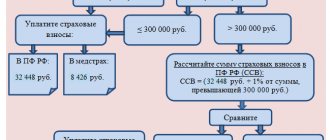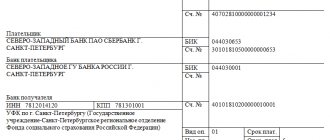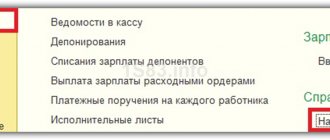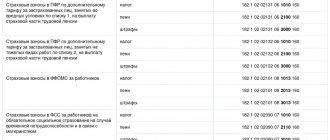Currently, fundamental changes are taking place in the field of pension provision for citizens of the Russian Federation. At the moment, there have been no changes in the field of compulsory pension insurance (OPI). Insurance premiums for compulsory health insurance also remain with the employer. They represent mandatory payments as a percentage of employee income and are not a fixed amount (except for individual entrepreneurs). The essence of the compulsory pension system is that when citizens reach retirement age, they are provided with a cash pension. Since 01/01/2017, the functions of insurance premiums have been performed by the Federal Tax Service.
Let's consider contributions to compulsory pension insurance in force in 2021.
general information
The state has certain social obligations to its people, for the fulfillment of which it needs financial resources. However, it is impossible to simply print money, since the Central Bank can print rubles only by issuing foreign currencies. Thus, in order to pay civil servants' salaries, scholarships, pensions and make various social payments, employers contribute a certain percentage of the wages of hired personnel to the state budget.
At the same time, for each category of expenses, its own fund is formed, which forms the budget and is responsible for fulfilling social obligations. Insurance premiums of the compulsory pension insurance company, what this is has already been discussed earlier, are paid to the Pension Fund. Insurance pension contributions, on the basis of which the pension budget is created, are paid by employers as a percentage of the employee’s salary, but at the same time they are not subtracted from it, but are considered a separate item of expense for the insurer.
Security fire alarm
Considering the options for answering the question: “What is OPS?” - it is worth remembering another, no less important decoding of this abbreviation. We are talking about a fire alarm system. It, like the Twix chocolate bar from an advertisement, combines two functions at once.
- Provides fire safety.
- Takes care of protecting the facility from intruders.
As a rule, such a system is installed in enterprises of various sizes, in shopping centers and office premises. Less often in private homes.
Unfortunately, due to the fact that installing an alarm system is a rather expensive undertaking, it is rarely installed in most government institutions, not to mention residential buildings. Meanwhile, the benefits of a fire alarm system are difficult to overestimate. After all, it helps prevent thousands of fires and crimes every year around the world.
Installation of an alarm system is not cheap due to the fact that several steps are required to complete it.
- Select a performing company. The quality of installation and functioning of future alarms depends on her experience and qualifications.
- Make a project. Theoretically, you can compose it yourself. However, if you have no experience, it is better to turn to professionals. The best option is when the OPS project is done by the same company, which will subsequently install the system.
- The actual installation of the fire alarm system itself. This is a very labor-intensive and responsible process. Needless to say that it should be carried out by professionals?
- Monitoring the serviceability of the security system. Even if the fire alarm system has been installed perfectly, it is still worth checking periodically whether it is working correctly. After all, even the most perfect mechanism can fail. Of course, the OPS check is also paid, but is it worth saving when it comes to safety for life and health?
Basic principles of OPS
OPS is a system created by the state to compensate retired citizens for part of their lost income. These citizens belong to the category of insured persons.
The operating principles of the OPS are based on individual accounting of the labor activity of each citizen, which allows the state to:
- keep records of insurance proceeds to the personal account of each citizen;
- monitor a citizen’s employment and the duration of work there;
- determine the number of pension points, on the basis of which the amount of a well-deserved pension is calculated.
Insurance payments are made to all citizens who have retired as a result of reaching retirement age, acquiring disability or losing a breadwinner.
Summary
Important conclusions regarding the current pension insurance system in Russia:
- Insurance upon reaching retirement age is mandatory for all residents of the country. Following the requirement of Federal Law No. 167Z, insurers pay special contributions to the compulsory health insurance account for all working employees to their individual personal account.
- The country's main insurer is the Pension Fund (PFR). It records all incoming money in the personal accounts of registered citizens, according to the established tariffs.
- Payments under compulsory health insurance are “included” when the insured citizen reaches certain conditions. The most common type of payment is an old-age insurance pension. Such a pension is assigned to a person when he reaches the age of retirement.
Structure of the OPS
To fully understand how the pension system works, you need to have an idea of the structure of the compulsory pension system.
The following insurance payments are deducted from the salary of each officially employed employee:
- Insurance premiums for compulsory health insurance, what it is and why we have already discussed it, are 22% if the amount of annual contributions does not exceed the established limit. Otherwise, the amount of deductions is reduced to 10%.
- Insurance contributions in connection with disability and maternity are 2.9% until the established maximum value is reached, after which the fees cease to be collected.
- Compulsory medical insurance fees are 5.1%.
- Deductions for injuries at work - from 0.2 to 8.5 percent. At the same time, the amount of the insurance contribution to the compulsory pension insurance depends on the type of activity.
It is important to understand that, according to current legislation, this tariff will be valid until the end of 2019, after which the amount of deductions will be increased.
What functions does the OPS system perform?
Mandatory Pension Insurance performs four-stage functionality, namely:
Article on the topic: Pension insurance and compulsory insurance
| №/№ | Functional | Explanations |
| 1. | Investment | The formation of funds also occurs through the investment of temporarily free money received from sources such as insurance premiums, fines, etc. |
| 2. | Accumulating | OPS funds are collected at “one address” - the Pension Fund budget and are taken into account as a total amount, regardless of what source they came from |
| 3. | Regulatory | Money received by the Pension Fund budget is subject to redistribution in space/time |
| 4. | Warranty | Citizens who fall under the insurance claim can count on receiving an insurance payment, provided that they have met all the conditions necessary for the assignment of a pension |
How is the Pension Fund formed?
The formation and calculation of the Pension Fund has some features. This year, the amount of insurance contributions per employee at the enterprise reached 876,000 rubles, and the amount of contributions exceeding this limit changed from 22 to 10 percent.
The insurance limit in case of injury and temporary loss of ability to work, as well as maternity, is 755,000 rubles, but when it is reached, deductions stop. In addition, it can be lowered due to paid sick leave and maternity leave.
The calculation of the amount of insurance deductions is carried out at the time of approval and calculation of wages, and their deductions occur monthly. Tax reports are submitted quarterly. The transmission of documents for companies with more than 25 employees is carried out only electronically, and for companies with fewer employees, a paper version is available.
Which categories of citizens are required to pay insurance premiums?
According to Russian legislation, insurance premiums are required to be paid by:
- Citizens making payments to other persons.
- Companies that have at least 1 hired employee.
- IP.
- Individuals who do not fall under the category of individual entrepreneurs.
- Self-employed population.
Representatives of various categories of taxpayers are obligated to pay insurance premiums for each category of compulsory pension insurance. In 2021, a law came into force according to which the self-employed population is defined as a separate category of taxpayers who are obliged to pay insurance premiums for compulsory health insurance; we have already discussed what this is and why, in a fixed amount.
Post office
This phrase is another answer to the question “OPS – what is it?”
For several centuries, the post office has specialized in the delivery of letters, postcards and parcels of various sizes, as well as in the sending of money transfers.
It is worth noting that in the modern world, its big competition is the Internet and SMS messages, online banking, as well as private courier services. Despite this, post offices are still not without work.
The number of public safety organizations in a particular locality directly depends on its size and population. Thus, in villages and small towns there are usually one or two such institutions. However, in large cities there may be more than a dozen of them, and each of them will have its own index.
For example, Moscow post offices are evenly distributed across thirteen postal districts of the city. At the same time, in the capital of the Russian Federation there are over five hundred OPS in total. And this is after the reduction.
In the capital of Ukraine, the city of Kyiv, there are much fewer such institutions. Their number is just over 230.
It is worth noting that in most countries of the world today there is an active modernization of security systems. At the same time, post offices in small towns and villages are usually under threat of closure due to their low profitability.
What is the procedure for paying insurance premiums?
According to the Tax Code of the Russian Federation, insurance premiums for compulsory health insurance must be transferred on the 15th of each month. If the 15th falls on a holiday or weekend, then the deadline for paying contributions is moved to the first working day. If for any reason a company or individual entrepreneur did not manage to transfer the insurance premium on time, then it will be forcibly collected from them by the regulatory body.
The tax base is formed as follows:
- basic tariff – 22%;
- additional tariff – 10%; accrued if the established limit is exceeded;
- contributions for compulsory medical insurance – 5.1%.
It is worth noting that the maximum amount of the insurance base from which insurance fees must be paid is 796 thousand rubles.
Procedure for calculating insurance premiums
The OPS base is determined for each employee separately. Contributions must be paid from the beginning of the billing period at the end of the working month. Moreover, the amount of contributions is the same for everyone, regardless of working conditions. Employees who work in hazardous or hazardous work are not entitled to any benefits.
Accounting for insurance premiums is carried out separately for each type of insurance. For each contribution, a settlement document is used, which indicates the treasury account and the BCC. Insurance premiums for compulsory insurance are paid at the bank. If there is no bank in the locality, then the transfer of insurance premiums can be carried out through the cash desk of the local administration or by mail. In this case, contributions are paid in full, without dividing into insurance and savings parts.
Organized crime community
OPS is also a synonym for the word OCG (organized criminal group).
Regardless of the specifics of the activity, the goal of such a community is to use all possible methods to make a profit, including those prohibited by law.
It is worth noting that OPS often has legal enterprises. Their work does not violate any laws. With their help, illegal income is legalized.
Additional contributions to OPS
According to changes in legislation, payment of insurance premiums for compulsory health insurance for employees whose working conditions are associated with harmful or negative effects of the environment or other factors is carried out at additional rates.
These government measures were taken to:
- provide safer working conditions for workers;
- establish a certain class of working conditions in order to provide guarantees and pay compensation of the appropriate amount.
Compulsory health insurance and compulsory medical insurance premiums in this case are calculated based on the results obtained during a special assessment of working conditions.
The following rules apply when calculating:
- If a special assessment has been carried out, then the amount of the additional contribution is established based on the hazard class with which the production is associated. The higher it is, the higher the insurance premiums will be.
- If no assessment has been carried out, the base tariff is 9% for List 1 and 6% for all other lists.
An assessment of working conditions must be carried out by the employer at least once every 5 years, and its implementation must be carried out by the management of the enterprise.
Natural environment
Another answer to the question “OPS – what is it?” - natural environment.
This concept includes all natural components such as atmospheric air, the bowels of the earth, soil, various types of reservoirs, as well as natural complexes, landscapes and objects that determine the conditions for the existence of humans as a biological organism.
They are influenced by the following groups of factors:
- Abiotic - inanimate nature (climate, atmosphere, lithosphere, hydrosphere).
- Biotic are living organisms that are different from humans and are their “neighbors.”
- Anthropogenic – human activity.
The five types of decoding of the OPS abbreviation considered are only the most well-known options. In fact, there are several dozen ways to interpret this abbreviation. For this reason, when faced with this letter combination, you always need to clarify the context so as not to get into an absurd situation.
Tariffs for reduced-size security insurance
Insurance premiums for compulsory pension insurance in a fixed amount apply to all taxpayers, with the exception of a few categories.
Table 1. Reduced tariffs apply
| Contribution amount | Taxpayer category |
| 20,00% | For individual entrepreneurs working under the patent tax system. For companies and individual entrepreneurs working under the simplified tax system. Organizations whose activities are related to the pharmacological field. Organizations working in the field of science, culture and healthcare and using the simplified tax system. Companies involved in charitable activities. |
| 14,00% | Participants of the Skolkovo project. |
| 8,00% | Companies and individual entrepreneurs operating in special economic zones. Companies operating in the field of information technology. Organizations founded by scientific institutions. |
| 6,00% | Insureds working in Crimea and Sevastopol, as well as in areas with advanced economic development. Companies and individual entrepreneurs registered in the free port of Vladivostok. |
Insurance contributions for the payment of compulsory pension insurance may be canceled if the categories of taxpayers listed in the table reach the limit of the contribution base.
Insurers
Since OPS is a mandatory procedure, when receiving a pension insurance card, all participants are subject to fairly strict requirements.
The insurer is, by and large, the main administrator of the insurance policy system. In this case, its role is played by the Pension Fund of the Russian Federation. The insurer can also be a non-state governing body or even a management company. However, the last two categories have the right to carry out activities only in relation to funded pension contributions.
When determining the decoding of OPS and its features, it is worth saying that any citizen has the right to choose through which body he will be insured.
Exemption from paying contributions to compulsory pension insurance
Representatives of small businesses registered as individual entrepreneurs and paying insurance premiums for themselves may be exempt from taxes for periods during which they did not carry out any business activity. It is worth noting here that the opportunity to receive tax benefits is available not only to the self-employed population, but also to representatives of other categories of taxpayers.
The legal grounds that provide the opportunity to cancel insurance premiums for compulsory health insurance paid to the Federal Tax Service are:
- Completion of compulsory military service.
- Caring for a child up to 1.5 years old.
- Caring for a disabled person or an elderly person over 80 years of age.
- Living with a military personnel for five years, if there is no employment opportunity at the place of stay.
- Staying abroad for 5 years with a spouse working in a diplomatic mission and staying in the territory of another country on duty.
It is worth noting that in all of the above cases, the periods are counted towards the length of service on an equal basis with the usual ones, when contributions to compulsory pension insurance were deducted to the pension fund.
Current tariffs for individual entrepreneurs who do not have hired personnel
Individual entrepreneurs who work without hiring labor and receive income from their activities also fall into the category of taxpayers, but they are subject to different tariffs.
The contribution amount is calculated based on annual income and is:
- If the annual income is less than 300 thousand rubles, then the contribution is fixed and amounts to 26%.
- If the annual income exceeds the established limit, then individual entrepreneurs must pay contributions in the amount of 27%.
This tariff applies to all individual entrepreneurs, with the exception of categories falling under state benefits.







